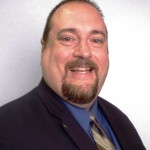Styrofoam wig heads. Wig heads?!? I needed two and I needed them fast because the news media was coming in one hour. My featured physician expert wanted to use Styrofoam wig heads to demonstrate a point about deep-sea diving and respiratory function. After a half-dozen calls and old-fashioned research in the Yellow Pages (years ago, in a pre-Google era), I finally found wig heads! I knew then that public relations, and especially healthcare PR, was going to be an adventure. This field requires resourcefulness, creativity, confidence, strategic thinking and endless amounts of energy. With more than 20 years in the business, my career in communications has been rewarding, challenging, interesting, exciting and fun.
I currently serve as the assistant vice president for marketing and public relations at Baptist Health South Florida—the largest not-for-profit healthcare organization in the region—based in Miami. On a typical day, I grab coffee (essential!) and my iPhone and start checking email. I also scan news headlines and social media sites on my iPad to see what is happening locally and nationally. Most days involve meeting with internal clients, handling media requests, brainstorming with staff, strategizing about opportunities and developing creative communications plans. Whether promoting a new center, treatment or pitching a unique story, we are constantly looking for ways to position Baptist Health as the go-to source for leading-edge healthcare information.
Healthcare is one of the few growth industries in today’s tough economy. Recently, the national dialogue on healthcare reform has cast a negative spotlight on hospitals and healthcare organizations. To me, this is a great opportunity for PR professionals to reframe the conversation and focus attention on what is right about healthcare through meaningful and compelling stories.
The realm of healthcare PR is broad – from promoting hospitals and physician services to developing patient education materials to promoting medical devices, new technology and new treatments. You may handle everything from crisis response to event planning, community relations to employee communications, to media relations and more. The variety is what makes this field so interesting – no day is ever the same.
Whether you are just entering healthcare PR or considering a career in the field, you may find the following tips helpful. I try to keep them top of mind in my own practice.
Top 10 Tips for New Professionals in Healthcare PR (not necessarily in rank order):
1. Be flexible: Every day is different in PR – whether you are in healthcare or another industry. You need to be nimble, ready to change course and quick to seize opportunities on behalf of your clients.
2. Ask questions: You are new at this. Your boss expects you to work hard and to bring your best each day, but she also expects you to learn by asking questions.
3. Listen, listen, listen: And then, listen some more. Often, I hear students and young professionals comment that they entered the PR field because they “love people” and they are “good communicators.” Good communication starts with good listening. Before you can offer a client a solution, you need to really listen to how they define the problem or challenge.
4. Appreciate failure: This field is not for the faint of heart. Despite neurotic planning and the development of a dozen backup plans, things happen. Your beautiful outdoor event is blown away with hurricane-force winds or your celebrity speaker is a no-show as more than 500 guests eagerly anticipate her arrival. When something goes wrong, learn from it.
5. Play nicely with others: Throughout your career, you are going to work with a lot of people – some of whom you will like and others you will not. Business is about relationships.
6. Be resourceful: Know how to find the Styrofoam wig heads. And many other strange things that you will be asked to magically produce minutes before they are needed. Thank goodness for Google and FedEx.
7. Accept criticism with grace: Remember to say “thanks” when a supervisor or boss offers feedback or criticism about your work. Appreciate the fact that an experienced pro took the time to provide guidance.
8. Do your homework: Healthcare is complex. As communicators, we have to sort out the clinical jargon and develop materials that are easy to read and understand. Learn the terminology. Take classes or seminars in marketing, budgeting, healthcare administration.
9. Show compassion: In healthcare, we have the unique position of caring for patients and their families when they are most vulnerable. We have a tremendous responsibility to be thoughtful, transparent and compassionate in our communications to various audiences.
10. Look before you leap: Your mom was right. Before jumping into a project or charging ahead to seize an opportunity, pause for a minute to make sure you have a solid plan. PR is fast-moving, but a wise mentor once taught me that “speed kills.” While you need to be ready for action, PR requires strategic thinking and careful planning.
Rapid change and growth in healthcare, coupled with dynamic changes in PR and communication, make it an exciting time to be in this field – for new professionals and for seasoned practitioners.
Christine Kotler is assistant vice president for marketing and public relations at Baptist Health South Florida. She is a member of the PRSA Health Academy Executive Committee. She can be reached at ckotler@baptisthealth.net. Follow Baptist Health on Twitter.

